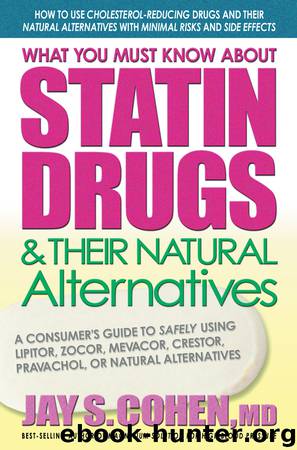What you must know about Statin Drugs & their Natural Alternatives: A Consumer's Guide to Safely Using Lipitor, Zocor, Mevacor, Crestor, Pravachol, or Natural Alternatives by Jay S. Cohen MD

Author:Jay S. Cohen, MD
Language: eng
Format: epub
Publisher: Square One Publishers
8
Effective Alternative Therapies for Reducing Cholesterol and Other Risk Factors
Precision prescribing means considering all reasonable possibilities for treatment. Indeed, in an optimal healthcare system, solutions for many disorders would begin with nutrition, then natural interventions, then pharmaceuticals. That is not the predominant model today, but natural therapies have gained an unprecedented role in many people’s healthcare. In 2000, 150 million Americans spent $17 billion dollars on dietary supplements. However, in 2002, the U.S. Department of Health and Human Services reported that “most complementary and alternative modalities have not yet been scientifically studied and found to be safe and effective.”1 This is not surprising, considering that every time you turn on the TV or radio, there is another promotion for a new supplement to cure whatever ails you. The supplement market is an unregulated modern-day Wild West in which there are too many claims and too little science. It is easy to see what prompted the American Medical Association to declare: “There is little evidence to confirm the safety or efficacy of most alternative therapies.”2
Even in the Old West, good things were happening amid the tumult, and it is in the alternative world that people are seeking natural solutions that are more physiologic and safer than prescription pharmaceuticals. The result is that there are now several natural remedies that are proven to reduce LDL-C and a few that raise the good HDL-C. However, because of the limited financial resources of their manufacturers and little interest among mainstream doctors and journals, studies on these natural products are far fewer than those on prescription statins. Placebo-controlled, double-blind studies are few, and there are hardly any long-term studies of these products’ impact on morbidity and mortality. Still, the studies that exist have been promising, and clinical experience has often been rewarding.
Dr. Robert Rowen, a practitioner of integrative medicine in Santa Rosa, CA who is board certified in family practice and a fellow of the American Academy of Family Physicians, wrote to me:
Regarding alternatives to statins, my brother is a good case in point. With a cholesterol of 230, his doctor tried to talk him into taking a statin. Instead, I recommended a standard dose of red yeast rice and guggulipid. His LDL cholesterol dropped 30 points. I rarely have to use statin drugs between red yeast, guggulipid, niacin, and dietary change. The only time statins may be useful is for familial hypercholesterolemia [a severe, genetic form of elevated cholesterol]. I have not written an original prescription for statin drugs ever.
Dr. Rowen isn’t alone. Thousands of doctors in North and South America, Europe, and Asia use alternative therapies to lower cholesterol without resorting to prescription drugs. These methods may not be FDA approved, but this does not mean they might not work. Doctors use prescription drugs every day in ways that are not FDA approved, so why not consider using proven-effective natural alternatives for lowering cholesterol and CRP?
Some doctors are uncomfortable using natural alternatives because it means making decisions on less scientific data than for prescription drugs.
Download
This site does not store any files on its server. We only index and link to content provided by other sites. Please contact the content providers to delete copyright contents if any and email us, we'll remove relevant links or contents immediately.
| Adult Children of Alcoholics | Alcoholism |
| Drug Dependency | Gambling |
| Hoarding | Obsessive Compulsive Disorder (OCD) |
| Sexual | Smoking |
| Substance Abuse | Twelve-Step Programs |
The Hacking of the American Mind by Robert H. Lustig(3580)
Right Here, Right Now by Georgia Beers(3497)
Fingerprints of the Gods by Graham Hancock(3214)
Goodbye Paradise(2964)
Bad Pharma by Ben Goldacre(2730)
Happiness by Matthieu Ricard(2524)
More Language of Letting Go: 366 New Daily Meditations by Melody Beattie(2444)
The Social Psychology of Inequality by Unknown(2311)
Drugs Unlimited by Mike Power(2193)
The Plant Paradox by Dr. Steven R. Gundry M.D(2040)
Confessions of a Shopaholic by Sophie Kinsella(1865)
Borders by unknow(1786)
Make Love Not Porn by Cindy Gallop(1752)
Dry by Augusten Burroughs(1688)
Stop Being Mean to Yourself: A Story About Finding the True Meaning of Self-Love by Melody Beattie(1656)
Getting Off by Erica Garza(1619)
Yoga and the Twelve-Step Path by Kyczy Hawk(1533)
Weed, Inc. by Ben Cort(1512)
Unmasking Male Depression by Archibald D. Hart(1508)
